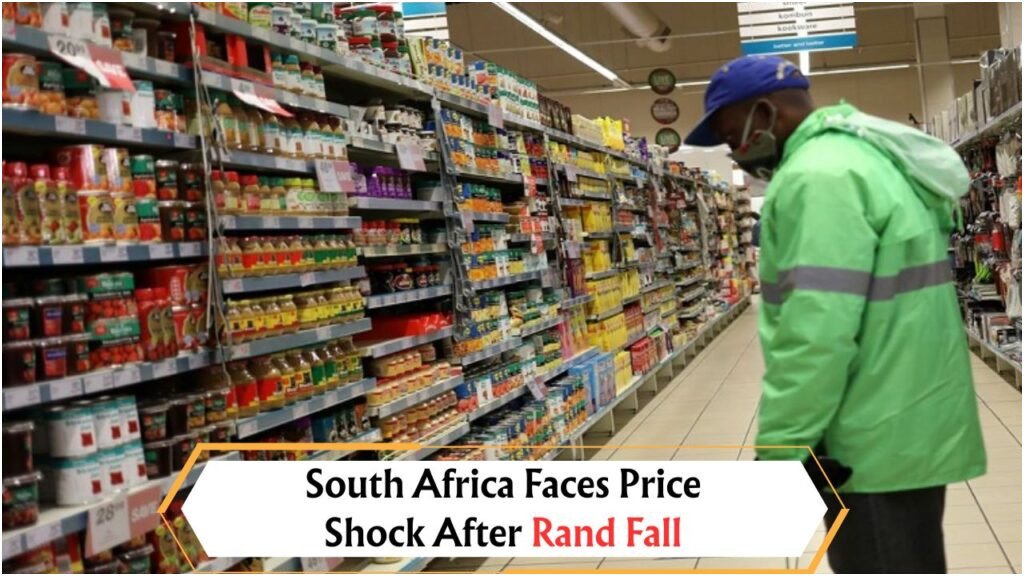Rand Plummets to R18.23 Per Dollar: The South African economy braces itself for a turbulent August 2025 as the rand falls sharply to R18.23 against the dollar. This significant depreciation of the local currency is expected to have a ripple effect on consumer prices, particularly in the petrol and grocery sectors. With South Africa heavily reliant on imports, the weakened rand means higher costs for imported goods and services, directly impacting the wallets of everyday citizens. As residents gear up for the financial strain, questions loom about how long this downturn will last and what measures can be taken to mitigate its effects.
Impact on Petrol Prices in South Africa
The depreciation of the rand is poised to cause a substantial hike in petrol prices across the nation. Petrol is a crucial commodity in South Africa, influencing the cost of transportation and, consequently, the prices of goods. As the rand weakens, import costs for crude oil increase, leading to higher fuel prices. This uptick in petrol prices often results in a chain reaction, affecting public transport fares and the cost of goods transported by road. South Africans are likely to experience these changes at the pumps almost immediately, with forecasts suggesting a rise in petrol prices by several rands per litre.
- Expected petrol price increase: R1.50 – R2.00 per litre.
- Crude oil import costs rise due to weaker rand.
- Public transport fares may increase as operators offset costs.
- Goods transportation costs likely to increase, affecting retail prices.
Fluctuations in Grocery Prices
| Product | Current Price | Projected Price | Percentage Increase |
|---|---|---|---|
| Bread | R15.00 | R18.00 | 20% |
| Milk (2L) | R26.00 | R30.00 | 15.4% |
| Sugar (1kg) | R18.00 | R22.00 | 22.2% |
| Cooking Oil (750ml) | R24.00 | R28.00 | 16.7% |
| Eggs (12) | R30.00 | R36.00 | 20% |
| Rice (1kg) | R20.00 | R25.00 | 25% |
| Flour (1kg) | R15.00 | R19.00 | 26.7% |
| Fruit Juice (1L) | R18.00 | R22.00 | 22.2% |
What Contributes to the Rand Weakness?
The current economic climate in South Africa is influenced by several factors contributing to the rand’s depreciation. Global economic uncertainties, including geopolitical tensions and trade wars, have made investors cautious, pulling funds from emerging markets like South Africa. Locally, issues such as power supply instability, political unrest, and slow economic growth have further weakened the currency. These domestic challenges, coupled with global pressures, have compounded to cause the rand’s slump against the dollar.
- Geopolitical tensions affecting emerging markets.
- Local issues like power supply and political instability.
- Slow economic growth impacting investor confidence.
Steps to Manage Household Expenses During Currency Fluctuations
As the rand continues to struggle, South African households must take proactive steps to manage their expenses. Budgeting becomes crucial in such times to ensure that families can meet essential needs without falling into debt. Consumers can explore buying in bulk or seeking out discounts and promotions to save on groceries. Additionally, reducing reliance on personal vehicles by using public transport or carpooling can help mitigate the impact of rising petrol prices.
- Implement strict budgeting to manage household expenses.
- Look for bulk buying options to reduce grocery costs.
- Utilize public transport or carpool to save on fuel.
Government Measures to Stabilize the Rand
The South African government is likely to implement several measures to stabilize the rand and cushion the economy from further shocks. Monetary policy adjustments by the South African Reserve Bank (SARB), such as interest rate hikes, could help control inflation and stabilize the currency. Additionally, fostering a stable political environment and improving infrastructure may attract foreign investment, strengthening the rand.
- Possible interest rate hikes by SARB to control inflation.
- Improving political stability could boost investor confidence.
- Infrastructure development may attract foreign investment.
Preparing for Economic Shifts
| Factor | Impact | Government Action | Outcome |
|---|---|---|---|
| Interest Rates | Inflation Control | Rate Hikes | Currency Stabilization |
| Political Stability | Investor Confidence | Policy Reforms | Increased Investment |
| Infrastructure | Economic Growth | Development Plans | Job Creation |
| Global Markets | Trade Balance | Export Promotion | Currency Strengthening |
| Energy Supply | Production Costs | Renewable Projects | Cost Reduction |
FAQ Section
Why is the rand weakening?
The rand is weakening due to global economic uncertainties, local political instability, and economic challenges.
How will the rand’s depreciation affect consumers?
Consumers will face higher prices for imported goods, including petrol and groceries, due to increased import costs.
What can households do to manage rising costs?
Households can budget carefully, buy in bulk, use public transport, and look for discounts to manage expenses.
What steps is the government taking?
The government may implement monetary policy adjustments, improve political stability, and enhance infrastructure to stabilize the rand.
Will the rand recover soon?
The rand’s recovery depends on both global market conditions and domestic economic policies. Improvements may take time.





